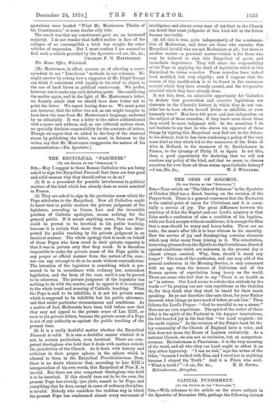THE ODES OF SOLOMON.
[TO THE EDITOR or THE"SPECTATOR."] Sin,—Your article on "The Odes of Solomon" in the Spectator of October 22nd has a direct bearing on the revision of the Prayer-book. There is a general consensus that the Eucharist is the central point of union for Christians, and it is essen- tially a service of joy. The great difference between the ministry of John the Baptist and our Lord's ministry is that John made a confession of sins a condition of his baptism, while our Lord accepts without conditions; it is enough for Him that a man should be weary and heavy-laden. There are no tests ; the man's after life is to bear witness to his sincerity. Now the service of joy and thanksgiving contains elements which may deter many from joining in it. The exhortation, borrowing phrases from the Epistle to the Corinthians, directed against conditions which are unknown in the present day is almost always omitted. Why, then, should it stand any longer ? The tone of the confession, and one may add of the general confession in the Morning Service, is only consonant with an age when the terrors of Calvinism and of the Roman system of reprobation hung heavy on the world. There are some who feel that to say "There is no health in us " is untrue. Our Lord seems to rebuke this attitude by the words :—" In praying use not vain repetitions as the Gentiles do, for they think that they shall be heard for their much speaking. Be ye not therefore like unto them, for your Father knoweth what things ye have need of before ye ask him." Then follows the Lord's Prayer : " God be merciful to me a sinner." Here are no vain repetitions. The spirit of the writer of these Odes is the spirit of the Psalmist in his happier inspirations, his full-hearted joy in the fact that "the Lord reigneth : let the earth rejoice." In the revision of the Prayer-book let the lay community of the Church of England have a voice, and that does not mean the House of Laymen exclusively. As a national Church, we aim not at exclusion, but at comprehen- siveness. Exclusiveness is Pharisaism ; it is the very meaning of the word, and all who obey our Lord ought to abhor it as they abhor hypocrisy. " I ran no risk," says the writer of the Odes, "because I walked with Him, and I erred not in anything because I obeyed the Truth." And it is Pilate who said : " What is truth ? "—I am, Sir, &c., E. D. &Mils. Helensbourne, Abingdon.






































 Previous page
Previous page